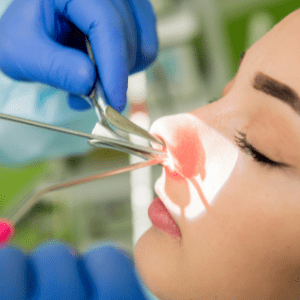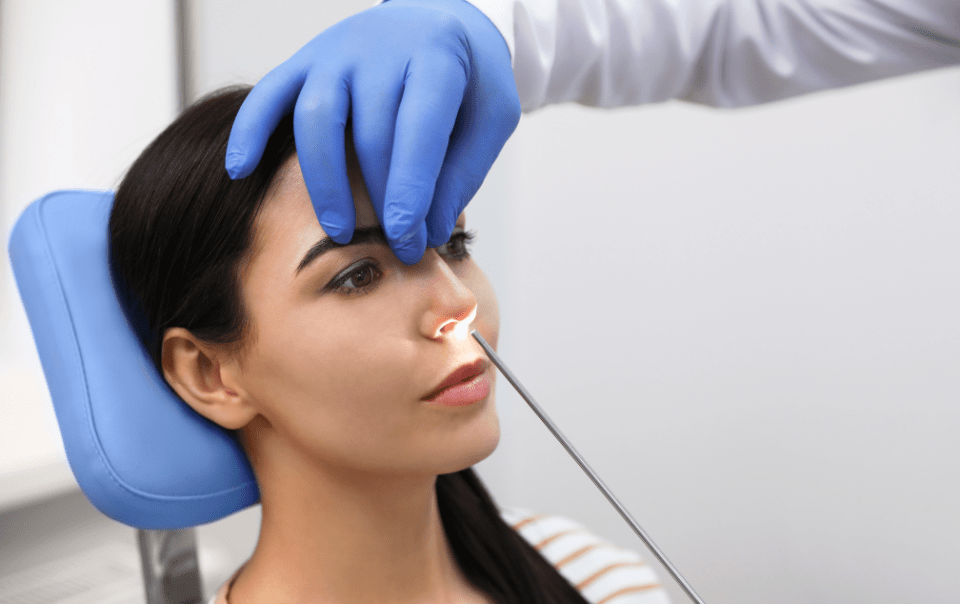Inside your nose are six filter-like shelves, known as turbinates (aka nasal conchae) that help filter, moisturize and humidify the air every time you inhale or take a breath. As such nasal congestion or blockages are often the outcome when these filters are exposed to toxins, irritants, allergens, and dust in the air or become swollen or enlarged from infection or trauma.
People prone to sinus infections and congestion tend to experience swelling or structural issues with the inferior and middle turbinates inside their noses. Over time, chronic infections, inflammation and irritants cause nasal congestion and turbinate hypertrophy. Standard treatment protocols include antibiotics, decongestants, saline rinses, antihistamines, steroid pills or nasal sprays, but often these are not adequate and turbinate reduction procedures are necessary.
The Impact of Living With Turbinate Hypertrophy
Everyone responds differently to medications, and over time they become less effective at resolving the condition. Alternative treatments such as turbinate reduction surgery is often necessary. Without treatment, turbinate hypertrophy can have a negative impact on one’s quality of life due to the breathing, sleeping, and snoring problems and chronic sinus infections and headaches.
Many people find breathing with congested turbinates difficult and are unaware of how ineffective over-the-counter medications and remedies are for long-term management. Though it’s not uncommon for turbinates to swell and shrink back down to normal size periodically, not all cases resolve so easily. Sometimes the turbinates can become chronically swollen due to deformities in the nose, severe allergies, and chronic health disorders.
Turbinate Reduction Treatment Success Rate

Turbinate reduction procedures are done to eliminate nasal blockages, congestion, and overall nasal discomfort in the nose to make it easier to breathe. The procedure is commonly performed on individuals with septal deviations or sinus problems at the same time as their other procedures, like septoplasty, in-office balloon sinuplasty and minimally invasive image-guided endoscopic sinus surgery.
Treatment is necessary to reduce swelling and correct structural issues within the turbinates. The procedure effectively alleviates nasal congestion due to allergies, sinus infections, hormones, weather conditions, medications, etc. The success rate of these procedures depends on a variety of factors, however long-term success with these procedure depends on the surgeon’s expertise, the type of turbinate reduction procedure performed, the post procedure care to help things heal as well as the original cause of the condition. The following conditions contribute to turbinate reduction surgery outcomes and success rates:
Patient Age: Turbinate reductions are routinely performed on patients of all ages. Yet, those who are younger with worsening inflammation (i.e. allergies, irritants, etc) have the largest chance of re-inflammation after 10-20 years.
Nostril Size: Narrower nostrils are harder to perform treatment on but it’s not impossible. Dr.Alen Cohen is highly skilled at performing turbinate reductions on nostrils of all sizes and ages.
Patient Health: Underlying health concerns, such as allergies, infections, polyps or nasal deformities, like valve collapse or a deviated septum, can lower treatment efficacy for some people. Post-operatively, patients with chronic sinus infections may experience slower healing, nasal irritation and discharge as well as congestion.
Turbinate Reduction Procedure Types
Success rates are highly dependent on the method of treatment administered. At the Southern California Sinus Institute, world-renowned board-certified expert, Dr. Alen Cohen, performs the following turbinate reduction procedure:
Microdebrider-assisted turbinate reduction (aka submucuous resection of turbinates) is a relatively quick procedure that is performed in the office under local anesthesia in under 15 minutes. It is commonly offered to patients seeking long-term or permanent relief from swollen nasal conchae. Microdebrider-assisted reduction surgery involves Dr. Cohen liposuctioning and remodeling the bone inside the turbinates to allow proper airflow. This turbinate reduction surgery is beneficial for patients because it leaves the functional respiratory mucosa completely intact. Dr. Cohen has never had a single patient develop the dreaded Empty Nose Syndrome with this technique as no healthy mucosa is removed. Furthermore, the risk of scar tissue and bleeding or infection is less than 1% in Dr. Cohen’s expert hands.
Microbrider-assisted submucous reduction treatment enables patients to breathe and sleep easier, thus minimizing the amount of upper respiratory discomfort, nasal congestion, and inflammation they may experience during future sinus or upper respiratory infections and allergy flare ups. It also reduces the frequency of future sinus and allergy attacks and infections.
All other techniques such as Coblation, Laser Turbinate Reduction or Electrocautery have been associated with a high rate of either recurrence, scar tissue formation, infection, delayed healing or the dreaded Empty Nose Syndrome.
Can You Benefit From Turbinate Reduction?
Turbinate reduction surgery opens the nostrils and airways to make it easier for people to breathe freely. There is a slight risk of the condition redeveloping over many years due to chronic infections or severe allergies, if patients don’t follow Dr. Cohen’s postoperative care. Some patients, especially those who suffer from chronic sinus infections or severe allergies, or persistent nasal irritation, benefit from having additional surgeries to improve the function of their nasal airways. As such most often Dr. Alen Cohen will perform this procedure in conjunction with in-office balloon sinuplasty or outpatient septoplasty, valve repair or minimally invasive image-guided endoscopic sinus surgrery.
To learn how turbinate reduction surgery can help you breathe easily and eliminate nasal congestion and stuffiness, call the Southern California Sinus Institute and Dr. Alen Cohen at (818) 888-7878 to discuss your situation and get the help you deserve!

